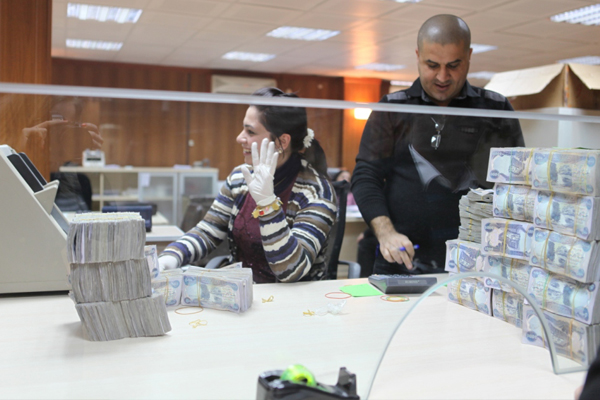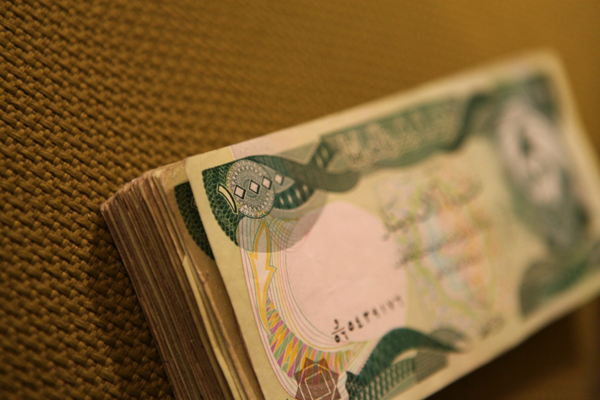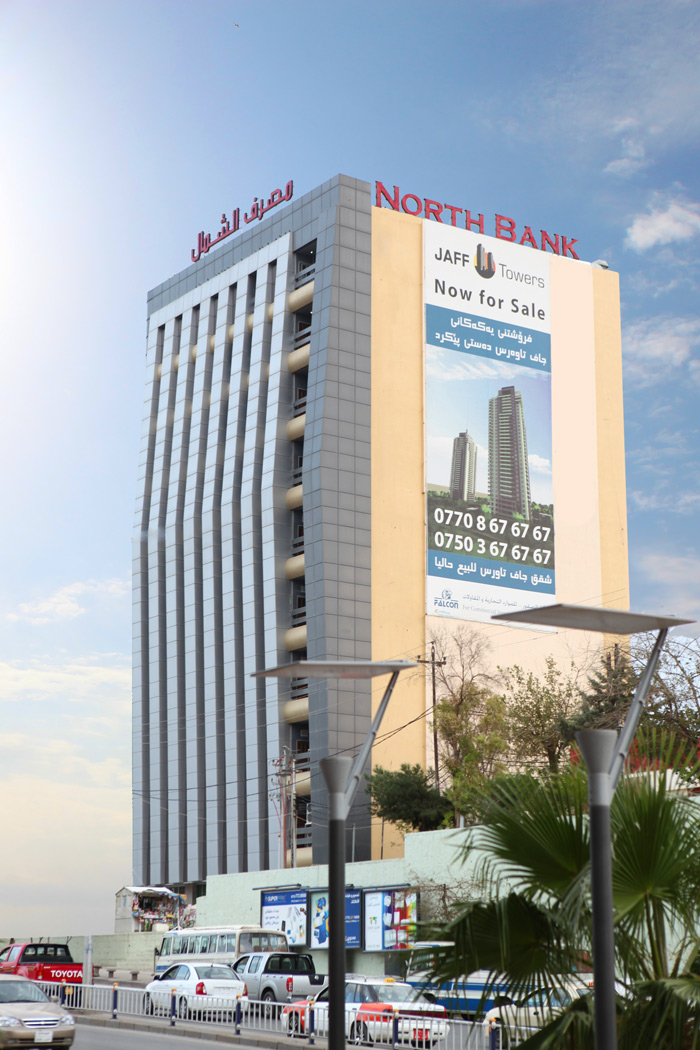Iraq and Iraqi Kurdistan: Banking Sector Analysis
In a region of nearly five million citizens and hundreds of new business operations, banking experts refer to autonomous Kurdistan as “underbanked” and thus see opportunity in opening branches there or creating entirely new banks.

By TK Maloy
In a region of nearly five million citizens and hundreds of new business operations, banking experts refer to autonomous Kurdistan as “underbanked” and thus see opportunity in opening branches there or creating entirely new banks.
According to a 2011 report, by Iraqi Investment Bank Dar Es Salaam, Iraq boast only around 900 bank branches that serve a population of 30 million, citizens. To contrast the degree of underbaking in Iraq and Kurdistan; in neighboring Jordan, with one-fifth of the population, there are more than 600 bank branches,
Member of the Finance Committee of the (Iraqi) National Alliance, deputyAbdel Hussein Al–Yasiri, in a news report said,
This market is very new and it is an open market. The size of the economy in Kurdistan in particular and Iraq in general is so big that there is room for another hundred banks to enter the market.
“the local banks of Iraq are unable to fulfill the demand of the country because the funding is very limited and also these local banks do not have the privileges which global banks have.”
That said, a number of analysts have emphasized that the main challenge in establishing a modern banking sector is not only the Kurdish preference for holding cash at home but also the overall Iraqi preference for keeping cash in general, based on long habit.
But the banks and the KRG are optimistic as to the ultimate growth potential of the sector given the rapid economic growth of the region.
In a statement from the Kurdistan Regional Government: “Finance is a sector in the region, which has seen development in recent years, but further reforms are still needed to enhance this sector. Foreign Direct Investment along with local investment is key to the development of the regional banking system.”
Opportunities
Adding also, “Kurdistan is rapidly becoming the ideal place to expand the commercial and retail banking sector.” 
The Central Bank of Iraq, established as Iraq’s independent central bank by the Central Bank of Iraq Law of March 6, 2004, supervises the banking sector, maintains the price stability, implements monetary policy, manages foreign reserves, issues and manages the currency and issues licenses.
In a recent MarcoPolis.net interview with Nozad Dawood Fattah Al Jaff, Chairman of North Bank, the banking head pointed out the relatively new state of the banking market and the room for growth
“This market is very new and it is an open market. The size of the economy in Kurdistan in particular and Iraq in general is so big that there is room for another hundred banks (click for the list of largest banks in Iraq) to enter the market.”
He added, “Competition comes if you actually get involved in the daily market business, which is the policy that North Bank is following. North Bank is the largest bank in Iraq (private) in terms of giving loans and we surpass the second closest bank in this area by at least three times.”
For the North Bank head “We welcome any other banks to do business in this area.”
He noted “Every bank has its own specialty and a new variety of expertise would definitely help this important sector to grow, be it in Iraq or particularly in Kurdistan.”
Challenges
Economist Dr. Salahaddin Osman, in an interview with the Kurdish Globe, explained that a developed banking system is an essential part of any economy’s growth, adding that a strong banking sector is necessary for creating an investment-friendly environment. 
However, he said the Iraqi and Kurdish economies banking sector has noted weaknesses.
Historically in the Kurdistan region, most citizens have always opted for hiding their money at home, because of a lack of trust in banks for depositing hard-earned money.
Osman said that the majority of daily transactions – of any kind – are cash – even though sizable amounts are cumbersome to carry. He also said that this lack of a banking culture and religious ideologies are the two main factors Kurdish citizens do not avail themselves of Western banking services.
Osman said that the majority of daily transactions – of any kind – are cash – even though sizable amounts are cumbersome to carry.
However, the landscape is rapidly changing. The analysis, conducted by Ahmad Saleh, senior research analyst at IraqiXchange, indicates that for the first time in the modern era, bank deposits in Iraq accounted for more than half of the money supply. “Iraq’s economy is growing out of its wartime difficulties quickly and transitioning from a centralized economy to one that is market-based,” says Saleh, an Iraq native and veteran North American banking analyst.
Furthermore, North Bank, Iraq’s largest private bank reported that the deposits grew a by whopping 45 percent in the first half of 2012 to reach ID 917 billion, with customers further attracted by the seven percent return given on their money.
Investing in the Banking Sector in Iraq
When it comes to investing in the local banking sector, Mark DeWeaver, the principal at Quantrarian Capital Management and the stock market investor believes that the biggest challenge to the banking sector in Iraq is related party transactions.
“The real issue with the banks in Iraq is not how they’re reporting but what they’re really doing. And a lot of what they’re really doing involves related party transactions, in which the majority shareholder family are using bank funds for projects of their own.” DeWeaver said. “An interesting example of this is that majority shareholders apparently sometimes will get a line of credit from their own bank to subscribe to the bank’s rights issues”
He added, “In other words, when their bank has a rights issue, they’ll take up the rights on the shares that they’re holding by borrowing money from their own bank to pay for them. That means that the capital base of the banks is not quite what it seems.”
If those majority shareholders don’t pay back these loans, the new capital disappears,” DeWeaeve said. “As long as everything’s going fine for the majority shareholder family, such capital is real capital I suppose but it is very contingent on the majority shareholder’s ability to repay the bank.”
Despite the criticism, DeWeaver remains optimistic about banks in Iraq and the stock market in general. He sees the market increasing by five or 10 times its current amount. When asked, what is the market potential? DeWeaver answer is unwavering; “In analogous cases like Russia, Sri Lanka or China, the market went up by anywhere from five to 10 times. That doesn’t mean that any particular person is going to make five to ten times their money because people are going to sell at all different points. I think the potential for anyone buying in the Iraq stock market today, with a horizon of maybe three to five years, to make several times the initial investment is very clearly there. This is a case in which the potential reward far exceeds the risks.”
On the market where 80 percent of the free floats are banks, the outlook for private banks remains bullish.
According to Kurdistan regional expert Shwan Zulal, the banking sector in Kurdistan and Iraq needs of major reforms. “There are a number of banks interested in the market as it has huge growth potential but lack of strong regulator robust regulations is deterring major banking players from entering the country.”
Zulal added, “There are shortages of skills and technology but this can only be achieved by attracting the right banks in Iraq to invest in the infrastructure.”
He notes that the state banks are “very inefficient and although have a proportionate share of the market which is largely deposit, it has not helped step up the reconstruction and development of Iraq as expected. The banks structures and the way its run is not viable. Due to theirs size and Monopolies, they discourage competitions.”
Regulatory Challenges
Policy wise, In recent years, the CBI has implemented two prudential supervision policies, -(1) requiring all private-sector banks to meet arbitrary capital targets (The government believes that there is a need for a consolidation and sees 10 strong private banks to emerge, making at least 13 takeover targets) and (2) imposing an impossibly burdensome anti-money laundering (AML) regime.
While capital adequacy is normally measured as a ratio of capital to risk-weighted assets, the CBI has instead imposed absolute levels of capital (IQD 150 billion by the middle of 2012, IQD 250 billion by the middle of 2013) regardless of the size of the banks’ loan books.
Given that most of the banks have more cash than loans, there is really no justification for this on prudential grounds.

The policy is rather an attempt to force the banks to lend more and to coerce the smaller banks into merging with one another. It is, in other words, an attempt to replace market forces with central planning.
The majority of private banks in Iraq affirmed that the regulation would allow public banks to monopolize the banking process especially after imposing new restrictions that require from private banks to raise their capital funds to 250 billion Iraqi Dinar by the end of 2013. While private banks caution that this decision would paralyze the private bank sector, Iraq’s central bank deem the decision as necessary to preserve Iraqi funds deposited in these banks.
Another challenge for the private banks in Iraq is that most government agencies and state-owned companies — and employees — are restricted from dealing with private banks.
Another challenge for the private banks in Iraq is that most government agencies and state-owned companies — and employees — are restricted from dealing with private banks. Thus, the two largest public bank effectively dominated the Iraqi banking space and the most lucrative sectors of the economy, giving little leeway for the private banking sector. The private banking lending activity thus focuses on the consumer loans, infrastructure, manufacturing and construction sectors.
Furthermore, high compliance cost for risk management and imposing an impossibly burdensome anti-money laundering (AML) regime on private banks makes the private banking environment very challenging.
The impact of the state bank loan and public sector monopoly on the economic growth “is substantial and by having a state-owned bank monopoly, they contribute to the dysfunctional private sector in Iraq, stifling growth and economic activity from other sectors not related to oil.
A healthy economy will need a functioning banking system to enable capital flow freely, but that has not happened in Iraq. In order to make that happen, sensible financial regulation is required and state- owned entities like the Trade Bank of Iraq needs be reined in.” concluded Zulal.